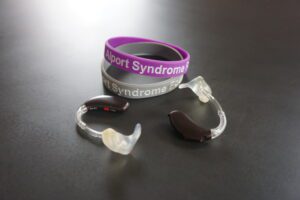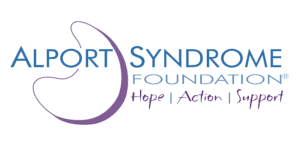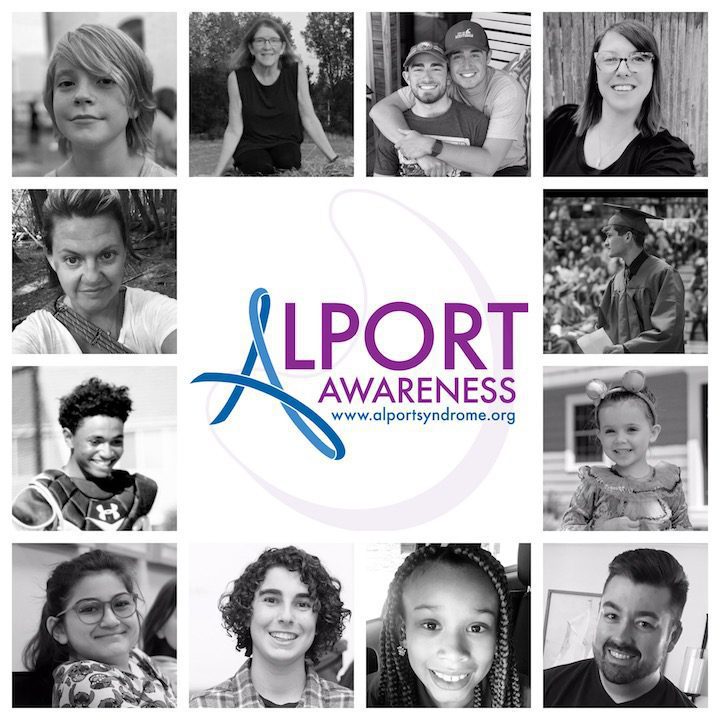When is hearing loss a good thing to discover in a child? It sounds like the beginning of a “dad joke.” The answer and consequences are real, and in the case of my family, odd as it may seem, related to a rare, genetic kidney disease that can be devastating.

I was misdiagnosed with the wrong kidney disease for more than 45 years, which led to the misdiagnosis of my youngest son when he was a baby. When he was in 5th grade we discovered he needed hearing aids. None of the medical professionals in our lives put it together, but my parental instincts kicked in. I searched the phrase “kidney disease and hearing loss” online. The results brought me to stories strikingly similar to my own. That moment changed our lives forever. Back to the dad joke punchline: Hearing loss led to my son’s accurate diagnosis of Alport syndrome, and then my own – a tough but positive thing.
Alport syndrome is caused by defects in collagen IV proteins found in the kidneys, ears, eyes, and other parts of the body. It causes fibrosis of the kidneys and often leads to end-stage renal failure. It can also cause hearing loss, eye abnormalities, and other complications.
Seven years later, in my role as Executive Director of Alport Syndrome Foundation (ASF), I am honored to be in touch with patients and families across the world. It’s frustrating to hear continued experiences of misdiagnosis or complete lack of diagnosis until young patients crash into the ER in full-blown renal failure. Far too many patients miss out on years of the current standard of care, education, and informed life choices due to lack of accurate diagnosis.

Not all Alport patients experience hearing loss, but many do. Our renal symptoms of persistent hematuria and proteinuria present similarly to many other chronic kidney diseases. It takes an astute nephrologist and/or renal pathologist reading a biopsy report, and/or genetic testing to correctly diagnosis us. We can be prescribed counter-effective drug therapies that progress our disease if not diagnosed correctly. Genetic testing is easily performed with blood, saliva, or cheek swab these days, and thankfully, there are programs for no-charge and or relatively low-cost genetic panels for Alport syndrome.
As rare disease folks understand, the power of patient organizations cannot be overstated. Important shifts in research and patient care occur when patients, families, researchers, and clinicians work together. During an October 29, 2020 virtual meeting of ASF’s Medical Advisory Committee, comprised of dedicated volunteer clinicians from across the country, it was the nephrologists who raised the question about why Alport syndrome remains so often misdiagnosed.
This led to the launch of our February 2021 Diagnosis Stories project. ASF staff (all two of us) worked with a small group of our medical advisors to shape a survey for adult patients, and adults who could report on their first child diagnosed with Alport syndrome. The purpose of the surveys is to capture patterns of misdiagnosis and tipping points for accurate diagnosis. Within a month’s time, thanks to a great patient community, we had collected 240 completed surveys and interviewed 4 representative female patients for a companion video piece that illuminates the survey findings.
We compiled the insights in a digital report, and are working to share them to improve diagnosis of our rare kidney disease. ASF released the initial findings during Alport Awareness month in March. We’re continuing to collect survey responses and will update the Diagnosis Stories report later in 2021. To check out our report, with many new insights, visit:
https://www.alportsyndrome.org/diagnosis-stories-survey-insights/
Lisa Bonebrake – Executive Director
 In 2014, after her youngest son was diagnosed with Alport syndrome, a rare genetic kidney disease, Lisa began writing grant applications, attending patient advocacy events, and planning patient programs for Alport Syndrome Foundation as a volunteer. Her son’s diagnosis led to the understanding of her own misdiagnosis stretching back more than four decades. As a patient, caregiver, and 30-year professional non-profit administrator, Lisa is uniquely qualified to help the Board of Directors lead Alport Syndrome Foundation’s efforts. She joined the staff in 2018. Lisa is dedicated to the organization’s personally meaningful mission.
In 2014, after her youngest son was diagnosed with Alport syndrome, a rare genetic kidney disease, Lisa began writing grant applications, attending patient advocacy events, and planning patient programs for Alport Syndrome Foundation as a volunteer. Her son’s diagnosis led to the understanding of her own misdiagnosis stretching back more than four decades. As a patient, caregiver, and 30-year professional non-profit administrator, Lisa is uniquely qualified to help the Board of Directors lead Alport Syndrome Foundation’s efforts. She joined the staff in 2018. Lisa is dedicated to the organization’s personally meaningful mission.







